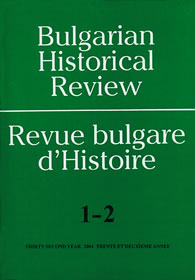Руската парадигма в Източния въпрос
The Russian Paradigm in the Eastern Issue
Author(s): Nina DyulgerovaSubject(s): History
Published by: Институт за исторически изследвания - Българска академия на науките
Summary/Abstract: By using the term „paradigm“ differently, the author aims to elucidate the main defining factors and driving mechanisms of Russia’s partaking in international relations concerning the Eastern Issue for nearly two centuries. The changes that took place in separate stages in the Eastern Issue came to the foreground in post-war conflicts between the Russian and the Ottoman Empires. Russia became a great power with its special place in the history of the Eastern Issue. However, the great number of Russian military victories was gradually ousted by the diminishing positive results of Russian diplomacy, which was being undermined by the cunning and extensive interference of other great powers, mainly England and France, in the European Southeast, the Caucasus and Middle Asia. Following the Berlin Congress in 1878, the geopolitical situation in Eastern Europe was changed. Petersburg’s predominantly emotional rather than rational political activities in the Balkans, having weak economic claims in comparison with the other big countries, predetermined the Russian Empire’s gradual loss of positions and influence in the complicated Eastern Issue.
Journal: Bulgarian Historical Review / Revue Bulgare d'Histoire
- Issue Year: 2006
- Issue No: 1-2
- Page Range: 234-239
- Page Count: 6
- Language: Bulgarian
- Content File-PDF

